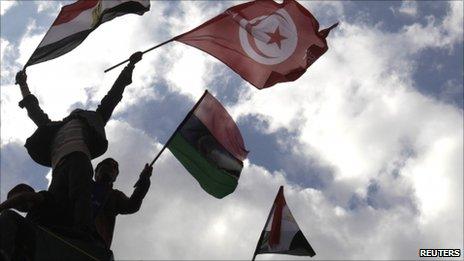What happened to the Arab Spring?
- Published

Protesters in Cairo wave Egyptian, Tunisian and Libya rebel flags
Think back to the dramatic events of January and February, when for a moment it seemed Arab dictators were falling like dominoes.
Then look at the bloody stalemate that characterises the region today.
The two trailblazers, Tunisia and Egypt, have entered an ambiguous transition as the forces of change confront old elites clinging to power and privilege.
Elsewhere - in Yemen, Syria, Bahrain and above all Libya - the dictators are hanging on, through the violent suppression of protest.
The notion that people power would sweep through the region, erasing the old order like a tsunami, was always illusory.
We are wrong to think that everything has changed - or that nothing has changed.
Three lessons stand out.
Lesson 1: All politics is local
While Arabs share the same grievances - over autocracy, corruption, the lack of jobs - the expression of these grievances plays out differently in each country.
In Egypt the generals were the decisive force in toppling the ruler (which does not make them revolutionaries).
In Syria and Bahrain there is a sectarian dimension fuelled by minority regimes for whom majority rule is especially threatening.
By sending troops into Bahrain, in response to an overblown Iranian threat, Saudi Arabia exacerbated sectarian tension.
Libya is different again, because of the lack of a strong centralised state - and because the opposition has called in Western help.
In no two cases is the balance of forces identical.
Lesson 2: Islam is part of the picture
In origin, the Arab uprisings were nationalistic. They brought together different groups united by the demand that a hated dictator should go.
But religion has not suddenly disappeared.
The question is not whether Islam will play a role in determining the region's future, but what that role will be.
For the moment, Islamist groups - notably the Muslim Brotherhood in Egypt - are speaking the language of democracy and national unity.
The Islamists realise they have a unique opportunity to enter the political arena.
It is an ideal moment to put their democratic pretensions to the test.
A split between a more reactionary Islamist old guard and a more open-minded younger generation is not inconceivable.
Lesson 3: The West is not the driver
Western powers, not least the Obama administration in Washington, have been slow to realise the limits of their influence. They are reacting to events, not driving them.
In Yemen, for example, the Americans initially supported President Ali Abdullah Saleh - but then, seeing the writing on the wall, began to distance themselves from him.
Even in Libya - the one place where the West has gambled on armed intervention - it is discovering it may not be able to determine the outcome.
However uncomfortable in the short run, in the end that may be no bad thing.
The Bush administration toppled the Saddam Hussein regime in Iraq, with consequences the region is still living with.
This time the pressure for regime change is coming from within.
Democratisation will be destabilising. It always is. And getting rid of the dictator does not necessarily produce democracy.
But everywhere the mood has changed. In city after city, the barrier of fear has been breached. In that sense, at least, there can be no going back.
Roger Hardy is a visiting fellow at the Centre for International Studies at London School of Economics.
- Published14 April 2011
- Published14 April 2011
- Published12 April 2011
- Published14 April 2011
- Published11 April 2011